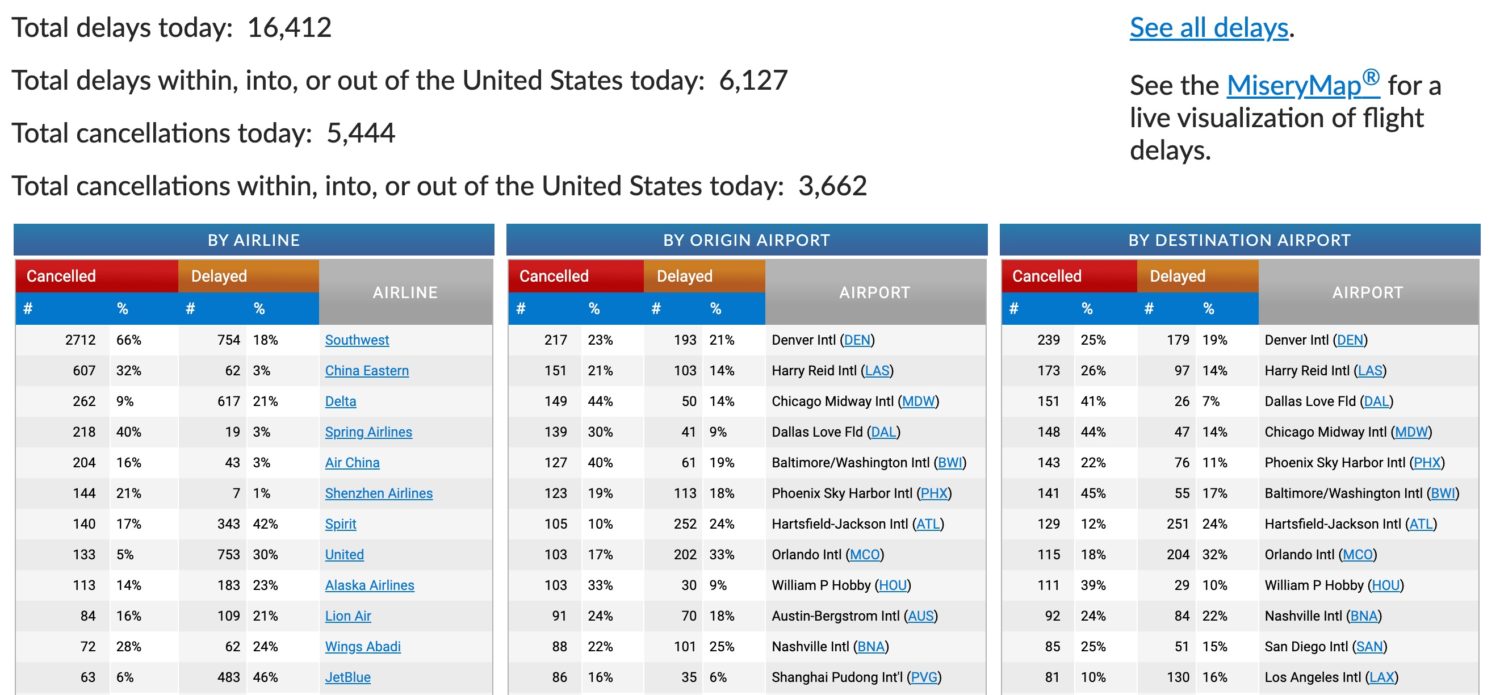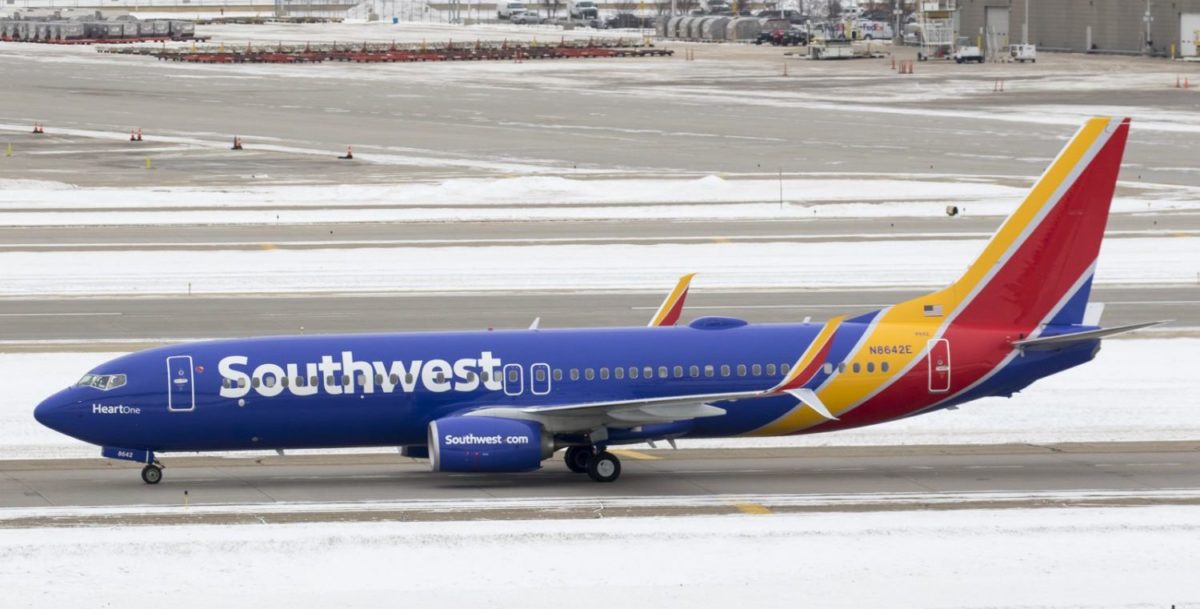With the Christmas rush and the worst of a historic winter storm that paralyzed travel nationwide in the rearview, Southwest Airlines still melted down Monday with more than 2,500 cancellations and counting.
Other airlines were struggling Monday but it's clear something was going horribly wrong with Southwest. The Dallas-based airline had canceled 2,700 flights by Monday afternoon – two-thirds of its entire schedule for the day, according to data from FlightAware.com. As delays turn to cancellations, that figure was likely to continue climbing. And Southwest seemed to be crumbling under the pressure: Its customer phone line returned a busy signal Monday afternoon, while travelers reported glitchy, if not unusable, experiences on its app and website.
It comes after a nearly unprecedented stretch of disruptions in U.S. air travel: Airlines canceled 15,200 flights from Thursday through Sunday and delayed more than 30,000 flights, as a brutal winter storm swept across the country, according to an analysis of FlightAware data.
But now, it's the snowball effect in action: Things have gotten worse and worse for Southwest. And given the scope of how bad things have gotten for Southwest, it may be days before they can actually reliably run flights on time. Case in point: By Monday evening, Southwest had already proactively canceled nearly 2,500 flights scheduled for Tuesday and another 2,000 for Wednesday.
Southwest isn't the first airline to melt down this year – far from it. Delta struggled repeatedly early this summer before stabilizing. Spirit canceled thousands of flights during a weeklong saga last summer. But this is much, much worse: Southwest carries at least four times as many passengers as Spirit.
Yet the problems are much the same. Airlines that shrunk during the worst of the pandemic haven't been able to grow fast enough back to 100%. When things go wrong, they go really wrong.
Throw a nationwide storm into the mix that paralyzed travel during the busiest days of the year, and airlines can't get caught up. Days of delays and cancellations have left planes and crews out of place or unable to pick up extra shifts after hitting their monthly maximum limits. And planes were already booked full to begin with, leaving airlines with precious few options to rebook passengers when things go wrong.

When airlines melt down, it's never just one problem but a perfect storm, and that's what has happened with Southwest this past week. Two of its biggest airports in Denver (DEN) and Chicago-Midway (MDW) got hammered by the storm. Add in an unusually nasty cold and flu season along with ongoing COVID-19 cases spreading, and getting the employees the airline needs to get planes on and off the ground on time is a major challenge.
As things went from bad to worse, Southwest finally issued a public statement Monday afternoon conceding the “unacceptable” disruptions, largely faulting the winter storm. But on a day in which it canceled two-thirds of its flights, the airline used the headline: “Southwest Airlines Recovering from Operational Challenges.”
“With consecutive days of extreme winter weather across our network behind us, continuing challenges are impacting our customers and employees in a significant way that is unacceptable,” the airline said. “We anticipate additional changes with an already reduced level of flights as we approach the coming New Year holiday travel period.”

While Southwest was the poster child for problems on Monday, they're not alone. Across the board, airlines were offering huge overtime payouts in hopes of keeping their flights running on time – and some were doing better than others. Despite righting the ship earlier this year after weeks of meltdowns, Delta has canceled about 250 flights for the day on Monday and delayed another 650 after its Atlanta (ATL) hub saw dangerously low temperatures over the weekend.
On the plus side, American Airlines was doing its best to reverse its reputation for poor on-time performance. The airline performed better than most U.S. carriers over the holidays and had canceled just a dozen flights by Monday afternoon.
What to Do If You're Flying This Week
Knowledge and preparation is power right now. Here's what you should keep in mind if you're traveling in the days and weeks ahead:
- Supposed to fly with Southwest this week? Book a backup flight on another airline … and do it now. It'll likely cost a lot, but it's a safer bet than Southwest. If (and likely when) Southwest eventually cancels your flight, you can get a refund.
- Watch for weather waivers that will allow you to change your flight to a few days earlier (or later) without paying change fees or hefty fare differences
- Monitor your airline & flight: Watch FlightAware.com in the days leading up to your trip to see if your airline is struggling. And use an app like Flighty to keep tabs on your flight in case of sudden changes or cancellations.
- Know your rights! Even if weather is the culprit, an airline canceling your flight allows you to scrap your entire reservation and get a full refund – not just a voucher with your airline.
- Scope out backup plans: Fire up Google Flights to find an alternative to get you where you need to go.
- Exhaust your options to reach your airline: Don't just wait in line at the airport. Get on the phone, send a direct message via Twitter, or text your airline, too.
- Book an early flight: This is your best chance of an on-time departure – the data doesn't lie.
Read the rest of our tips for flying smoothly when things go wrong!
Bottom Line
Southwest is in the midst of an unprecedented meltdown – perhaps the worst in more than a decade, if ever.
Canceling 2,700 flights in a single day is unacceptable. But given the scope of those problems, there's no guarantee things will get better flying Southwest soon.
Lead photo courtesy of Chris Lundberg via Flickr

As someone flying Delta on New Years Eve with flexible plans, I am wondering, could this result in volunteer opportunities? Perhaps crass/thoughtless to wonder but these are always a great way to score gift cards for future travel.
It’s a stretch to loop Delta’s performance measures on Monday into the Southwest ongoing meltdown. No comparison. 71% vs. 9%, not to mention a customer service response by Delta. Southwest, nothing. Their operation has completely collapsed.
And yeah, who would have ever thought AA would be the shining star in all of this. I guess hell did freeze over.
Didn’t mean to compare them in any way – they’re certainly leagues apart. Moreso to suggest that if not for Southwest being an absolute nightmare, Delta and other carriers would be getting at least a bit of scrutiny.
I listened to you interviewed about this on KFan today. While I understand that it was a rough storm for all the airlines, what is happening at SWA is not comparable to what happened to the other airlines. In 2003 Continental Airlines invested a ton of money on systems like CrewSolver and OpsSolver to prevent this type of meltdown. Improved systems like that exist today at United and are extremely expensive. These systems allow airlines to run solutions to plan and pre-cancel flights to allow for the most rapid restart possible after a storm like this. It positions aircraft and crews to ensure the smoothest and quickest return to normal operation possible. SWA has had years and years of profitability yet has obviously not invested in the same technology and that is why they are where they are today. Calling out all the airlines after what was an pretty miserable storm because one melted down just doesn’t seem fair. Very rarely does the Government fix anything with more regulation. In fact, it usually just adds costs to the end consumer. Instead of legislation, people should speak with their wallets and competition will lead to change. Continental didn’t invest in this technology back in the early 2000’s just because they wanted to. It gave them a competitive advantage and improved customer service. When you reward those that provide better service vs. simply seeking the cheapest fare, the consumer wins in the end.